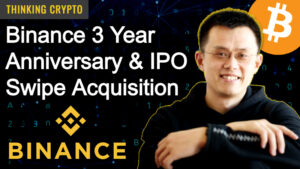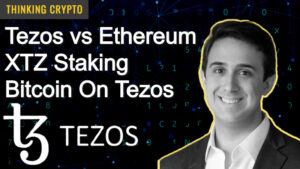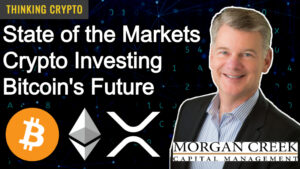Neil Bergquist is the cofounder and CEO of Coinme. In this interview we discuss Coinme’s services, partnership with Coinstar and MoneyGram, Bitcoin, Ethereum merge, crypto bear market, nfts, metaverse, tornado cash, and crypto regulations.
Coinme® operates a leading licensed cryptocurrency cash exchange in the U.S., founded in 2014 with a mission to be the world’s most trusted gateway to digital currencies and a better financial future. Coinme enables thousands of Coinstar and MoneyGram locations in 49 states to offer the cash purchase of seven cryptocurrencies, including bitcoin, Chainlink, Dogecoin, Ethereum, Litecoin, Polygon and Stellar Lumens. The company develops an enterprise-grade API helping to “crypto-enable” legacy financial systems and a vertically integrated suite of consumer products providing a simple, trusted, instant and affordable way to buy, sell, store and manage digital currencies.
Interview Transcript
Welcome back to the Thinking Crypto Podcast, your home for cryptocurrency news and interviews. With me today is Neil Bergquist, who’s the co-founder and CEO of Coinme. Neil, great to have you on the show.
- Great to be here, thanks for having me.
- Neil, I’m excited to speak with you. You guys are building one of the largest on-ramps to the crypto market for retail. And I got a lot of questions for you, but I wanna start with your background to get to know you better. Tell us about where you’re from and where you grew up.
- Yeah, I grew up in the Seattle area, actually a small town called Edmonds just north of the city. And then went to college down at William University in Oregon and came back to Seattle in 2010 and did a couple entrepreneurial endeavors, ended up at a company called SURF Incubator, and helped build a community support space to support entrepreneurs, had over 200 startups in the program, and it’s a great place to learn and that’s when I first learned about Bitcoin.
- And what was your aha moment when you first heard about Bitcoin? Did it take a few days, few weeks, few months for you to kind of digest it and then maybe it clicked for you?
- Yeah, it’s a good question. I think, I mean the technology and the uniqueness of it is pretty easy to understand, but the aha was when the price went from a $100 to $1,000. We’re like, “Oh!” That was aha moment right there. So yeah, I mean, I was a band wing fan. You know, that really just showed, it was just a reflection of the adoption for this new technology. And then you look at use cases of it as a store of value and as a medium of exchange and then seeing the adoption grow and the excitement around it, that really brought together the aha for me.
- Well, I know a lot of people share that same sentiment. The price action drew them in and then they stayed for the technology and the price too. So what led to the founding of Coinme?
- Really, it was just kicking around the idea with my co-founder and he was very gung-ho and ended up just buying three Bitcoin ATMs and there weren’t any in the United States at the time. And so then I started diving into, okay, well, how do we actually operate a business like this? You know, there’s really no clarity from state, federal, local regulators on how to operate a Bitcoin ATM or a Bitcoin exchange. And so was able to leverage some relationships with the incubator and brought in some experienced FinTech council, went down to the Washington state DFI, and had an opportunity to present on Bitcoin, and also share our passion just to protect people, and protect the customer and provide a trade trusted environment for people to transact. And at the time it was local Bitcoins. You know, you meet a stranger online and go to a coffee shop and give them cash for a USB stick that supposedly has Bitcoin on it. And that was the market. Or you had Mt. Gox and kind of resellers of Mount Mt. Gox in the US. And it was just very early and there really weren’t any trusted on-ramps. So also at that time, the headlines were Uber and Airbnb, where it’s just kind of idea of just blaze forward and break things and figure out regulation later. But this is money, you need to figure out regulation on day one. So fortunately, to the Washington DFI’s credit, they took the time to learn and move quickly and actually gave us a license to be a virtual currency money transmitter. And so we got a license and then subsequently launched the first license Bitcoin ATM in the world, one of the first 10, on May 1st, 2014. So we were off and running at that point and just an experiment. You know, why are we talking about an ATM in the 21st century? Why are we focused on cash? And we learned that there’s a few advantages, it’s super simple, in just a few clicks, you bought Bitcoin, also cash is still a very large payment type in the US in particular use cases like remittance, it’s actually the predominant payment type. So being able to have that cash on-ramp and then be able to just have the ease of use of a kiosk that’s familiar really made this kind of magic internet money thing seem real when you walk into a trusted retail establishment, see a kiosk, and can transact in real time.
- So you guys were certainly pioneers. I mean, you’re pretty early, 2014. And to your point, there wasn’t much clarity or guidance and you kind of found your way and now you’ve grown significantly. You mentioned you started with the ATM model, but now it seems like you’re supplying the ATM maybe software infrastructure to other, or retailers, and also Coinstar machines, and MoneyGram, and so forth. Can you tell us about those partnerships?
- Yeah, after deploying about 75 of the ATMs, I mean, the operational challenges of running hardware were very apparent. The machine breaks down, then it becomes offline, someone putting a debit card into the cash acceptor. I mean, you name it, it happens. And so whereas a company like Coinstar has spent 30 years figuring it out how to operate about 20,000 kiosks globally, and that was a business we didn’t necessarily want to do, we just did it because we had to build our own infrastructure back then. But after 2017, when Bitcoin got close to the 20k mark, I mean, a lot of the financial incumbents started taking it more seriously. So we were able to get in the door and present our software and wallet and just how we’ve been able to figure out the regulatory environment and be a licensed exchange. And we’re able to do a partnership with Coinstar. We’re essentially taking our regulated license and software and put that onto the kiosks where essentially those become Coinme kiosks without having to then deploy all those kiosks over the next decade. So it was really a great partnership, it was a win-win for both parties. And we launched that service in January of 2019 and it’s been the fastest growing product in Coinstar’s history and it’s been really the catalyst for our growth. We subsequently shut down the ATMs just to focus on the software enablement model. It’s a lot more scalable, it’s a lot more operationally efficient, and it provided the exact same value prop as what our Coinme ATMs provided. And so it gave us that ability to focus and build out that cash to crypto on-ramp on a very scalable way. And then after the Coinstar partnership, we built an API where we can crypto enable any kiosk, ATM, point of sale device, agent. And so our focus is finding partnerships where we can crypto enable their rails and be able to give people better access to crypto and the future of financial services.
- Oh, that’s amazing. I’m just thinking about when I was younger and collecting all the change and taking my parents change, running to the Coinstar machine, and getting some money. And now you can get crypto on those same machines. It’s pretty amazing how far we’ve come.
- Yeah, I did the same thing.
- Yeah. So tell us about how many locations are you? Is it worldwide or United States? Can you tell us a bit about that?
- Yeah, we’re just in the United States, 49 of the 50 states, still waited on the New York bit license. But we have about 10,000 Coinstar kiosks that are Coinme enabled and about 11,000 MoneyGram agent locations, which are predominantly CVS and ACE Cash Express. So about 21,000 locations. I think the thing that’s probably more exciting is just we have a mission around access and those locations actually are located within about five miles for 90% of the American population. So we’ve been able to really provide near ubiquitous coverage for people to be able to access cryptocurrencies.
- That’s amazing. And the MoneyGram partnership is pretty big. I mean, one of the largest payment transfer companies. How did that relationship come? How did that come about? And can you walk us through the process of how folks could get crypto via the MoneyGram station, so to speak, at your CVS and so forth?
- Yeah, it started out as just an exploratory conversation several years ago, and really looked at their technology to see how we could essentially use their cash network as a load and unload mechanism in and out of the Coinme wallet. And so we’re able to get a partnership done and be able to then have to get the retailers on board. And eventually we’re able to get the retailers on board with offering the service in their establishments, and then spent almost nine months on the integration and then announce that in May of 2020, 2021. And so it’s been a great partnership. It’s definitely interesting having a kiosk option. And then also then on the other end, having a human agent as another option. And we’ve learned that people still prefer the kiosk, whether that’s just the fact that it’s a few clicks and the kiosk, you know exactly what you’re gonna get. Whereas with an agent, there’s a bit of a learning curve as well, which has been interesting. So we’ve done agent training and help them be able to facilitate the transaction, ’cause they’re at a checkout stand at CVS, for example. They’re doing a lot of different things. But it’s been a great partnership, it’s just another avenue, another opportunity for us and made a lot of sense and we’ll continue adding cash partners in the US and we’re expanding into Latin America. So that’s another area, is that we will be adding new partnerships and build out a cash network with a vision for over a million locations. So we really just want access to just be commonplace and everywhere and be in the Coinme wallet and be able to use crypto to improve your everyday life, whether that’s as a store value, or for payments, remittances, and eventually earning yields and paying with your crypto and really just live in a financial life in a crypto native way.
- That’s amazing. And I wonder if you could walk us through the process, let’s say someone who’s listening, they walk into some sort of supermarket, there’s a Coinstar machine there, what would be the process? They have to download the Coinme wallet app? Can you talk us through the logistics of it?
- Yeah, if you’re a first time customer, you can just go to the kiosk and there’ll be a button there that says buy, “Crypto powered by Coinme.” You can click on that. And then we actually just announced multicoin support. So we offer seven different cryptocurrencies on the kiosk. So pick your crypto and then you can insert up to $2,900 cash at the kiosk, then you get a receipt. And if you’re a new customer, you go to Coinme.com or download the mobile app, create an account, and then type in the redemption code on the receipt and then there’s your crypto that will instantly show up in your wallet and it’s yours. If you want to transfer it to a ledger or cold storage, or if you wanna send it to friends and family, you can do that instantly, there’s no lockups on the crypto that you purchase. And then if you’re a returning customer, you just log into your wallet and type in the receipt code and there’s your crypto as well. So kind of a unique way of approaching it. And really, we were able to do this so we didn’t have to make any hardware changes at the Coinstar kiosk, which has been really helpful.
- For sure. And there was an announcement, if I’m not mistaken, that you guys just recently added six additional cryptos, Chainlink, Dogecoin, Ethereum, Litecoin, Stellar Lumens, Polygon. Tell us about that and your plans to continue to add more crypto.
- Yeah, since launch, I mean Bitcoin was the predominant coin in terms of the total crypto market cap. Now there’s about 20,000 different cryptocurrencies. And by adding these new coins, we’ve really increased our coverage of the total crypto market cap from about 40% to 65, 70%. So really have increased our coverage. For us, it’s finding coins that are not only in demand by customers, but also have unique value propositions that people are attracted to, particularly with our use case where not only are people buying as a store of value or you could put them into the trading persona, but also people are buying them as payments or they’re buying them for sending to friends and family. So being able to have coins that have unique value props to address the underlying use case is important for us. And yeah, we’re excited to be able to provide more consumer choice and we’ll see what people choose.
- Got it. And just to confirm, I know you mentioned it, the total amount of cryptos now that you have available?
- Yeah, on the Coinstar kiosks is what you mentioned, the Bitcoin plus the six additional ones. So we have seven in total there.
- Got it. A question that’s kind of tricky because we are still, in some ways, we don’t have full clarity in the United States with certain cryptocurrencies. I mean, you get an example, would be Ripple getting sued over XRP. Who knows what else the SEC’s gonna go after. How are you guys navigating those waters? Will you just simply remove or not add coins that are maybe under review of the SEC even though it’s a moving target?
- Yeah, I mean, you definitely look when you look do the token review process, you look at demand, you look at protocol risks, IT security risks associated with it, but then you go into the legal review of could this be seen as the securities or not. And there’s a little bit of guidance that the New York DFS provides in terms of a coin listing policy and what you need to do to really evaluate a coin to see if it can be added to a crypto exchange platform for trading and custody purposes. That’s helpful. But at the end of the day, it’s a risk based decision without any further guidance. So for us, obviously we want to take the low risk approach, not only for us as a business, but also for our customers, it’s obviously a horrible user experience to buy a crypto asset that then, “Oh, it’s actually a securities,” or, “Oh, it’s something different than I thought it was.” So we really want to protect our customers and ensure that us as the trusted counterparty are giving them something that we believe is a low risk long term. You know, when the SEC sued Ripple, I mean that put that in a high risk category. They’re publicly saying that we believe Ripple is a security. They don’t publicly say much in terms of what other cryptocurrencies are securities are not. So that made it pretty clear what they believe. And we’ll see what happens in court.
- Yeah, for sure. And obviously there’s a larger conversation, we’ll talk a bit about it later, but of crypto regulations with Congress, the SEC, even President Biden’s executive order, and things like that. But I mean, I get ahead of myself. I want to ask you about, and maybe you can give the perspective here, there are some people who are tech savvy and they’re crypto savvy, they’re the early adopters. And they’re like, “I will never use ATM or buy crypto from CVS,” but I often try to remind people, not everybody is of the same demographic and the same understanding and level of knowledge with how crypto works and so forth, but they will go to the places that are convenient for them. I’m wondering if you can give that perspective because you’re on the building side and you’re probably seeing your customer personas, who are the people that will be buying from these locations and what’s your outlook on that?
- Yeah, I think overall, the industry is going through crossing the chasm moment and in order for that to happen, there really needs to be a concerted effort to solve the UX issues associated with using crypto to solve, Clayton Christensen has this concept of jobs to be done, like people hire products in order to accomplish a job that they need to get done. Like in the morning, you hire coffee in order to accomplish your job of needing to be alert for a specific task or activity. So I’m gonna hire coffee, or maybe I’ll hire tea, or maybe I’ll hire something else. And so I think as companies like Coinme are building out these next generation user experiences, it’s gonna be less about crypto and less about how this accomplishes the job that you have to be done. And one of our particular use cases is sending money. We do surveys and analysis on chain activity, and we see people buying crypto with cash and sending it. Sending it to a wallet Luno, for example, in Africa. And so you can really see some of these examples and then customer support department having calls and helping people with their transactions and understanding what they’re trying to do with crypto. And what we’ve learned is fiat to fiat cross border is very expensive and that’s a financial system that has yet to really be innovated in a meaningful way. So crypto is unique because it’s interoperable. You don’t have to go through a closed system like Western Union, you can go through an interoperable system where maybe Coinme as the launchpad and another company is the landing pad, or maybe it’s not even a company, it’s a self- wallet, it’s a technology that they use to receive. And that interoperability is really interesting because it really does break down a lot of the barriers to access but also it creates and enables best in class use cases for different countries without either needing to be a closed loop system. And so all that to say, I think people are not gonna care about crypto, they’re just gonna care about sending money faster and cheaper. And so as we build out the technology to be able to allow people to send money faster and cheaper, those will become the value propositions, those will become the stories. It won’t be about crypto, it won’t be about Bitcoin, it won’t even use the word on-chain. It’ll be put cash here, send it to this phone number, and we’ll take care of the complexity on the back end. And you’ll be able to do that faster and cheaper than how you’re doing it today. And that’s really where we’re going and the industry’s gonna go overall in terms of helping people just accomplish those jobs to be done and crypto’s the magic piece that can make it happen.
- For sure. You mentioned your vision and the things you guys are working on. Is there anything else on your roadmap for the remainder of 2022 that you can share?
- Yeah, to that point of using crypto as a medium of exchange, we’re also looking at multichain functionality. You know, Bitcoin fees have been high, Bitcoin Lightning can help. You know, we took a batching approach to be able to reduce those fees significantly. But also people are looking to other coins that maybe are less volatile than Bitcoin, because there’s always that risk of the time of purchase to send, to liquidation, what’s it gonna do? Gain or a loss? So we’re integrating with USDC to be able to offer cash to digital cash with no volatility. And that’s much less of a cognitive leap than cash to this new crypto asset that’s not backed by anything other than the network and its protocol. So that will help in terms of crossing the chasm. And then with the multichain, USDC is ERC-20 is the predominant market for it. And that can be slow and expensive. Even with the Ethereum merge, it doesn’t seem like fees are gonna go down. So you’re still dealing with that on-chain complexity. So we also announced a partnership with Stellar where you’ll be able to sell, send the USDC on Stellar, and that costs about a penny. So literally cash to digital cash to any Stellar wallet in the world for a penny is the opportunity. And that’s something that we’ve announced and we’ll be going live with that later this year.
- That’s exciting. And yeah, to your point, just a major use case to be able to send money faster and cheaper. And I can see a lot of people using that. And to your point, using cash to just send money back home or to their family in other countries, whatever it may be. And then they can also grab Bitcoin or whatever it is if they want it as an investment, and hold it in a Coinme wallet. So that’s pretty cool that you’re setting up just a great on infrastructure and on-ramp.
- Yeah, exactly. I mean, it’s been fun kind of zooming out and just thinking about money and conceptually and what is money and moving beyond just, okay, it’s not just that governments can define money, money is how people use it and to see how people can use crypto as money, whether that’s as a store value for payments, send to friends and family, and then thinking about how can we create value propositions that are better than what people are currently doing with fiat money and backing into the value propositions has been a really fun process.
- Let’s jump to the crypto market and talk a bit about it. Certainly you’re what I would consider an OG, you got in 2014, right? So you’ve seen multiple bull markets, multiple bear markets, what are your thoughts on the current bear market? It seems that there are more macroeconomic factors, recession, inflation, so on and so forth. Are you phased by that or not? Are you’re just heads down, building like you’ve been in the years before?
- Yeah, I think for everyone that’s gone through a bear market before, there’s less of the shock of going through a bear market. You know, personally, I do hope that Bitcoin stays above 19,000, ’cause I think that if it drops below, then it’s a different level of a bear market. You know, historically though, I mean the Bitcoin lows have generally always been higher than the previous year’s lows. And I think we broke that this year. But historically, that’s been true and still 19,000 is a lot higher than $450 in 2014. So you still see that baked in value that people assigned to the overall price. But personally, I like bear markets, especially as an operator and a builder of the infrastructure. One: I always feel like we’re behind. You know, our products aren’t where they need to be, we’re not in as many markets as where we need to be, we need to grow faster. So when there’s a bear market, it feels like you kind of get the gift of a little more time before people start really wanting to have that craze to adopt and as a store value medium of exchange. So I appreciate the opportunity to build. Also in terms of hiring, when you’re in a bull market, you get a lot of candidates that just want to be part of a growth store, they don’t even really care about crypto or the mission of digital currency and blockchain technology, they just wanna be part of a growth story. Whereas when you go into a bear market, you find people that are more mission aligned, more the builder types that aren’t just here for the hype. So it’s also a great time to be recruiting and building a culture that is around the mission of the organization, which is a gateway to digital currency and a better financial future, but also as more of as a build mindset and isn’t just here for the flavor of the week and is really focused on the multi-year opportunity. So I like it for that reason. And for us as a business though, we’re not a crypto hedge fund, so we’re not necessarily feeling the pain as much as other companies in the industry are. You know, our business model is transaction fee based. And fortunately, our volumes have actually grown this year. Whereas a lot of just pure trading plays, the volumes have dropped, but we also serve markets like payments and remittance and trading. And so having that market diversification has really proven to be helpful. And as we as a business try to be resilient to be able to weather these ups and downs in the market. But it’s great to see people still using crypto despite the price of Bitcoin.
- Yeah, for sure. It seems that every year, we’re growing from an adoption standpoint, people understanding the technology, and whether investing in it, or utilizing it for different ways, sending money and so forth. I wanna get your thoughts on the upcoming Ethereum merge, which is scheduled for next month. You hinted to something that the fees may not be affected at all, the gas fees. People are maybe in anticipation of this. You know, what are your thoughts on it?
- It’s great, it’s awesome. I can’t wait. I mean, don’t spend too much time reading all the blogs and following the drama and the risk of it happening, not happening. It’s gonna happen in my opinion, it’s just a matter of when. It seems highly likely that it’s gonna happen here in a few weeks, which is even more exciting. But I think there’s a large portion of the market and the future market that is kind of a show me, don’t tell me kind of a market. And so is the merge baked into the price, you know? I don’t wanna speculate much on that, but I just think that once the merge happens, we’re gonna see a new wave of acceptance for blockchain and cryptocurrency as a useful technology, because just simply the shift to proof a stake is gonna be big. I mean, the energy consumption for Ethereum is gonna drop like 99.95%. And people that obviously bash Bitcoin for the energy usage, even though a lot of the miners are using clean energy, won’t have that argument anymore. And then also just showing that yes, there is a somewhat complex governance structure with some of these coins and blockchains, but it works. I mean, it’s evolving. And to prove that and to show that is a huge vote of confidence just on this general concept of being a decentralized autonomous organization and being able to be a community that’s really driving a product’s innovation, that it can work. You know, you don’t need a centralized leader, a CEO, or a government, you can actually be a community and drive innovation and change in a positive way. So I’m really excited for all these ideas to come together and just show me, don’t tell me. The merge is gonna happen once it happens. I think it’ll be extremely well received.
- For sure, yeah. I’m excited for that. And like you said, show me, don’t just tell me. I know there’s been delays and so forth, so hopefully everything goes smooth. What are your thoughts on the recent Tornado Cash situation? And this ties in a bit into lack of clarity. You know, the treasury went after Tornado Cash going after the code and the platform versus the nefarious actors, so to speak, who utilized the technology. What are your thoughts on that?
- Yeah, I think it’s a very interesting situation. I’m not surprised by the Treasury going after Tornado Cash, or just in general, going after ways to be able to launder money anonymously. I mean, the treasury is preventing. There’s an organization called FinCEN, Financial Crimes Enforcement Network. And we abide by FinCEN’s rules and regulations and policies and do everything we can to stay above compliance with FinCEN. And so for us, as a federal MSB, as a state licensed money transmitter, that they’re the rule makers. So we’re gonna follow the rules because we want to enable crypto to be able to be in a safe environment for our customers and be able to have that support of our government in doing that. This is not a topic that Coinme or companies like us, I suspect, are gonna fight or really challenge in any way, shape, or form. We don’t want people to launder money either. Money can be used like ammo and that ammo can go to bad things. And so we want to make sure that ammo doesn’t get in the hands of bad actors. So philosophically, I’m against money laundering, but at the same time, privacy. And then it’s like, so how do you have privacy and the right to privacy, but then have that not be misused by bad actors? And so it’s a very challenging situation. I don’t know the answer. I think it’ll be interesting to see some of the different coins and protocols and take on the matter as their own issues around privacy come to light. This is kind of a tip of the iceberg moment. Tether’s response is interesting. I don’t really know the complexities as to why they’re taking a little bit of a wait and see approach with that. But yeah, I think it’s been a long time coming and I’m surprised it hasn’t happened sooner.
- Yeah, it’s a very challenging situation. I’ve been thinking about it, trying to see what’s the balance, ’cause to your point, we don’t want criminal activities being happening on these platforms, but privacy to your point, so.
- Yeah. Same thing with NFTs. Like can you be anonymously buying a $20,000 NFT and then sending that in a decentralized way to someone else? And basically it’s acting like a store of value and you’re sending it so. But you’re not sending money, so you’re not abiding by the sending money laws, but it could act as money. So there’s a lot of complicated issues that are gonna need to be resolved here in the coming months and years. And we’ll see. You know, I think as an entrepreneur in the space, it’s all risk based decision making and we just try to take a low risk approach. At the same time, deliver innovative value to our customers. And that’s a balancing act and the companies are gonna be in that situation where they’re gonna have to make risk based decisions and some of them are gonna be right and some of ’em gonna be wrong. Ripple took a risk based decision and they’re on there in court to prove their point. So hopefully you can become a multi-billion dollar company before you find yourself in court. Otherwise, you probably won’t be able to defend yourself.
- Yeah, for sure. You mentioned NFTs. What are your thoughts on the technology and going beyond just artwork, maybe being adopted by different industries for contracts, for digital experiences, and so forth?
- Yeah, I think that there’s great promise in that. I think that as with all things in crypto and there’s a new opportunity that gets a lot of tailwinds and investor interest, I think that it really balloons quickly and then we’re gonna kind of back into the real world use cases eventually. I think some of the values that have been put on some of the NFTs, more from an arts and collectibles perspective, personally, I’m not an NFT speculator. We’ll see. Seems like the prices have corrected a fair amount. You know, Coinbase was late on their NFT marketplace and OpenSea has really taken the cake. But now there’s even questions around what are the real volumes of those platforms and is an NFT marketplace a long term opportunity or is it a flash in the pan? I think there is a long term opportunity for NFTs. I’m excited to see some of the more tangible use cases, back to your point, to where people don’t care about crypto or blockchain, but they find value in what the end product is. And particularly in gaming, there’s a lot of amazing opportunities for NFTs. You know, if you can spend all these hours building like an avatar or custom building a car or some metaverse environment in the game, can you tokenize it and put it onto a marketplace or exchange it or cross platform exchanging between games? I think that’s where people are gonna be really excited, particularly the gamers, and may not care about blockchain, even though they often do. Those types of use cases are gonna be resilient and long term and I think we’re at that point right now in the NFT space where those real world use cases are coming to the surface and the companies touting those are raising a lot of money and will make those user experience happen.
- I dunno if it makes sense given the model that you have, but is Coinme exploring potentially how you can either utilize NFTs or offer NFTs as you do the other cryptos?
- Yeah, I think there’s some fun concepts where we could create NFTs or we could reward people with NFTs. And that’s more around our crypto literacy initiative. So last year we launched cryptoliteracy.org, which is really just a way to drive financial literacy focused around cryptocurrency for people in the United States. Mexico and Brazil, actually. But a lot of attraction’s been in the US. And so for us, it’s like, well, let’s maybe gift our customers an NFT or maybe they can get rewarded with one just so they can learn what it is. You know, like learn it from a custody and ownership and what does this mean? And we see that more as an opportunity for general crypto education, but less as an opportunity to make money. We don’t have plans to build an NFT marketplace or anything like that. And so really seeing it as… But I do think it’s important that people understand what an NFT is and how it works and this whole concept of being able to tokenize something digitally in a unique way.
- For sure. I wanna get your thoughts on major institutions entering the crypto market like we’ve never seen before. Just, I believe it was last month or earlier this month, we had BlackRock make an announcement that they’re entering, partnering with Coinbase, launching a Bitcoin spot trust. You know, what are your thoughts on that? And I’m assuming the dominoes are gonna fall after BlackRock.
- Yeah, I think there’s been institutional adoption has just continued and if not accelerated year-over-year for a while now, I’d say probably since 2018. But yeah, BlackRock is definitely a big one. Congratulations to Coinbase for getting that deal done. It seemed like it came at a really good time for them given the Q2 earnings report. And I always like it when an institution adopts crypto when it’s not at a bull market and all about the price. So it’s great to see them continue with the integration at this time. I’m sure they were talking about this when Bitcoin was 50k, 60k, but it’s great to see them go forward with it despite the correction. I think I’m preaching to the choir here, but I mean, everyone’s gonna adopt cryptocurrencies. Come on. Like it’s one of the most popular asset classes, millennials are more likely to invest in cryptos and stocks, I mean, the survey says that the majority of people that own crypto would actually trade it with their existing financial institution if their financial institution offered it. So I mean the market data’s there, the companies that are doing this outside of the existing financial institution are unicorns. And so it’s just a matter of time that existing institutions that either are the bank or the FinTech or trading app or a broker dealer are gonna be offering support for cryptocurrency trading and custody.
- Yeah, exciting times ahead. And I always like to remind people, look at when these things are happening in the bear market. You know, and a lot of people are maybe a bit worried what’s going on with economy, with assets being down, but it’s all market cycles. We’re in a bear market right now, we’ll go back to a bull, and then we’ll go to another bear market, it’s all cycles.
- Yeah, in a month or two, Coinme will be announcing a crypto enablement of an existing institutional player as well. So for us, just like crypto enabling Coinstar, we can also crypto enable a bank, we could crypto enable a FinTech. And so for us, we have a great opportunity in the future to not necessarily compete for the end customer, but hey, let’s be the operating system for these other platforms that already have the customer and enable them to do what we do, crypto trading and custody, in a compliant and regulated way. So yeah, we’re excited to announce that and be able to explore more of these opportunities in the B2B crypto enablement space.
- So Neil, I know you can’t give a name, can you give us an industry?
- Tech.
- Okay, all right. Probably can’t get more than that, but I gotta ask. Awesome, let’s hit the wrap up questions here. Got some rapid fire questions for you. Favorite food?
- Italian.
- Favorite musician or band?
- Currently Glass Animals.
- Favorite movie?
- You know, I always just go back to Back to the Future. I think just based on how many times I’ve watched them.
- Can’t go wrong. I watch it when it’s on TV. Favorite book?
- Currently, The Curve of Time.
- And when you’re not working at Coinme, what are you doing as far as a hobby?
- Just getting outside, hiking, camping. You know, in the beautiful Pacific Northwest, you’ve got a bunch of national parks and some deep wilderness, and there’s no better way to unplug than to literally unplug and get out there and feel what it feels like to be human again and be a little minnow in a big world. So definitely enjoy the opportunities to get outdoors up here.
- Awesome. And finally, if you could create your own metaverse, what would the theme be?
- Don’t get me distracted here. I gotta stay focused on Coinme, but I think it’s gonna be exciting to see when the hardware comes around and Facebook’s announcing this new VR headset in the fall and I think it’s gonna really change the game finally for adoption into a metaverse world where you actually feel like you’re there. So with that, I feel like there’s an opportunity around just we’re all working remote, so being able to just work together again in a metaverse, whether that’s a simulated office environment, or co-working, or incubator, or accelerator, or some kind of community that is around a specific purpose where you can discover again, discover and meet a friend, discover and meet a new idea, discover something. And I think so often technology isn’t about discovering anymore, it’s about just finding what you already want. So I think there’s something there. Who knows, we’ll see. But it’s gonna take a long time for all that to unfold.
- For sure. Neil, pleasure chatting with you, and I’m excited to see the future updates around Coinme. Thank you so much for joining me today.
- Yeah, absolutely. Thanks for the opportunity. Have a great day.







